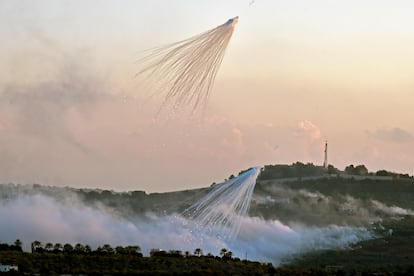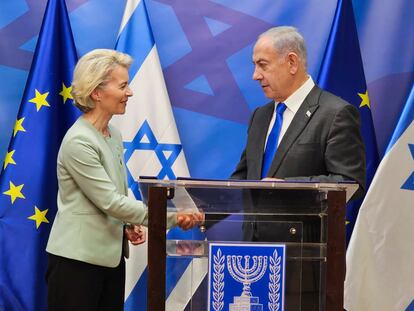EU fears regional escalation of conflict between Israel and Hamas
The leaders of the EU-27 will hold an emergency summit Tuesday to address the next steps in a conflict that could affect the bloc economically, socially and politically


The European Union is seriously concerned about the risk of a regional escalation of the war between Israel and Hamas. In addition to concern over the humanitarian crisis in the Gaza strip, besieged by the Israeli army in response to attacks by the Islamist organization, there is also a situation that threatens to apply more heat to an already simmering geopolitical chessboard. Brussels is alarmed by the prospect of the violence spreading to the West Bank and Lebanon, and that Iran could also be drawn into the conflict. But the situation in Egypt is also causing anxiety: Cairo is keeping its crossing from Gaza closed and has refused to create a humanitarian corridor for Palestinians fleeing Israel’s attacks, amid fears that they will settle in the Sinai. The Egyptian government cites national security and concerns that the displacement of Palestinian refugees into its territory will become permanent.
On Monday, following talks with Egypt, Brussels announced the deployment of a “humanitarian airlift,” which consists of sending several planes to Egypt carrying essential supplies for organizations in Gaza. The first flights will take place in the coming days. “The catastrophic humanitarian situation in Gaza is about to reach breaking point,” warned EU Commissioner for Crisis Management Janez Lenarcic, who added that the Rafah crossing to Gaza must be opened “without further delay.” EU sources state that the Egyptian authorities have accepted the passage of aid.
The leaders of the EU-27 will hold an emergency summit by videoconference Tuesday to address the next steps in a conflict of devastating effects, and one that EU sources warn could affect the bloc economically, socially and politically. These effects are becoming increasingly apparent as Israel prepares for a ground incursion into Gaza, an operation awaiting political approval that extensive Western diplomatic efforts are seeking to avoid.
Hezbollah — the militia supported by Iran in southern Lebanon — and Israel have exchanged fire in recent days, and the government of Benjamin Netanyahu has announced the evacuation of residents of 28 towns around one mile from the border with Lebanon. The West Bank has also seen an increase in violence. The situation in Jordan, which has a large Palestinian population, is also complicated.

Migratory movements
“There are major external security concerns, as well as internal ones, and alarm that this crisis will again lead to a critical humanitarian situation in the area and migratory movements to the EU,” says a senior source in Brussels. Meanwhile, Iranian Foreign Minister Hossein Amir-Abdollahian warned on Monday that time is running out to find a political solution to avoid an expansion of the conflict.
In recent days, and in the face of fears of regional escalation, the EU has increased its diplomatic efforts with key regional leaders in Jordan, Qatar and Egypt, which will hold a high-level meeting on the weekend to discuss the Palestinian situation, according to EU sources, although a European presence is not yet confirmed. Meanwhile, U.S. President Joe Biden will travel to Israel and Jordan Wednesday in an attempt to bring about a de-escalation.
There is growing concern about the situation of civilians in Gaza — there are also some 1,000 Europeans in the enclave — and over around 200 people kidnapped by Hamas (according to the latest Israeli figures), which de facto governs Gaza.
The EU is carrying out damage containment moves following the controversial visit to Israel of European Commission President Ursula von der Leyen, which was widely criticized for not publicly mentioning Israel’s obligations to respect international humanitarian law — which it is violating with its siege of Gaza — and for encroaching on the EU’s foreign policy jurisdiction, which lies with the EU-27. The leaders of the member states have instead stressed the need to protect Palestinian civilians.
“Strong engagement with regional actors is key, as they are the most impacted by the conflict and can play an effective role,” European Council President Charles Michel stated in the convening letter for Tuesday’s remote summit.
The EU’s reputation in the region has been damaged by the lack of coordination between its institutions over Von der Leyen’s trip and the EC president’s initial pro-Israel stance, a senior EU official warns. Despite the announcement that the European Commission will triple the most pressing aid to Palestinians to €75 million ($79 million), Brussels is keeping development aid under review to ensure that not a single euro goes to Hamas.
The EU is also concerned about the impact of Israel’s war against Hamas on its own security. Sources in Brussels point, for example, to fears of an increase in hate crimes, both anti-Semitic and Islamophobic, a matter to be discussed by interior ministers on Thursday at a meeting in Luxembourg.
Sign up for our weekly newsletter to get more English-language news coverage from EL PAÍS USA Edition
Tu suscripción se está usando en otro dispositivo
¿Quieres añadir otro usuario a tu suscripción?
Si continúas leyendo en este dispositivo, no se podrá leer en el otro.
FlechaTu suscripción se está usando en otro dispositivo y solo puedes acceder a EL PAÍS desde un dispositivo a la vez.
Si quieres compartir tu cuenta, cambia tu suscripción a la modalidad Premium, así podrás añadir otro usuario. Cada uno accederá con su propia cuenta de email, lo que os permitirá personalizar vuestra experiencia en EL PAÍS.
¿Tienes una suscripción de empresa? Accede aquí para contratar más cuentas.
En el caso de no saber quién está usando tu cuenta, te recomendamos cambiar tu contraseña aquí.
Si decides continuar compartiendo tu cuenta, este mensaje se mostrará en tu dispositivo y en el de la otra persona que está usando tu cuenta de forma indefinida, afectando a tu experiencia de lectura. Puedes consultar aquí los términos y condiciones de la suscripción digital.








































